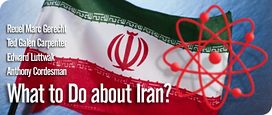I find it amusing that Mr. Gerecht asserts that it is unnecessary to respond at length to my thesis and then spends a major portion of his post responding to my thesis. His response, however, is decidedly underwhelming.
His first ploy is to try to impress (overawe?) readers with his knowledge about the personalities inhabiting the Iranian clerical regime. In the process he demonstrates his ignorance about far more crucial issues—most notably, the enduring features of international politics and deterrence theory. His attempt to minimize the relevance of America’s experience with Maoist China for our current policy options with Iran is especially telling. He wants us to forget that the Gerechts of that era were arguing just as passionately as he does about Iran now that the Chinese regime was run by revolutionary lunatics who could not be deterred. And proponents of war with China could cite numerous inflammatory quotes from Mao and his minions just as Mr. Gerecht and the war lobby can cite comments from Ahmadinejad and other members of the Iranian political elite. Just as Iran is deemed the godfather of Islamic terrorism, China was deemed the godfather of communist subversion and wars of national liberation. In both cases, the threat to America’s security and interests supposedly could be neutralized only by resorting to war.
Let’s be clear about what Mr. Gerecht is advocating. Because of the possibility that Iran might, someday, use nuclear weapons to attack or blackmail the United States or a U.S. ally, he wants to start a war now that would kill tens of thousands of Iranians. And that’s the level of carnage that would occur if we were “lucky” and such an attack did not trigger a full-scale regional war, or even worse, a war of civilizations. If either of the latter scenarios emerged, we would be counting the dead in the hundreds of thousands or millions. No decent nation should pursue such a policy unless there is no alternative. And Mr. Gerecht doesn’t even come close to making the case that we are at that point.
It also appears that he is not especially interested in whether we can halt Iran’s quest for nuclear weapons by peaceful means. The nuclear-weapons issue is simply a convenient pretext for pushing a policy of forcible regime change in Iran. He does so even though our last war for regime change (in Iraq) has not exactly been a sparkling success. Trying the same foolhardy strategy in a country with three times the population is an option wise policymakers should reject.

